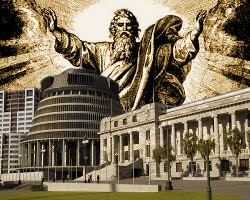Religion, rather than secularism, provides a secure basis for human equality and rights.
Category: political philosophy

Should religious people keep their divisive beliefs away from policies about marriage?
The green activists got up in arms about the introduction of genetically modified plants into the New Zealand market. But there is, as far as I can see, no widely lampooned caricature of people with environmental concerns as being socially divisive – in spite of those among their number who vandalised the farms of people suspected by them of having genetically modified crops. Large numbers of parents (the clear majority of those who voiced their opinion, in fact) raised their voices in protest when the government threatened to criminalise all use of any force in disciplining a child, while offering the benevolent promise that not all such criminals would be prosecuted (guess which way I lean on that). Parents were ignored and the law was changed, but more importantly here, nobody now thinks of parents as a uniquely divisive group within society. Many other people with common concerns or causes have likewise raised their voice in unison over other issues that concern them, but the fact that groups who do this in general do not get singled out as divisive or polarising is demonstrated by the way that just which groups spoke out over what issue is the kind of thing that tends to fade into obscurity in a relatively short time. But religion? Oh, that is different.
 In the Nuts and Bolts series I lay out some of the basic concepts thrown around in my areas of interest – philosophy, theology and biblical studies – and explain them for those unfamiliar with them.
In the Nuts and Bolts series I lay out some of the basic concepts thrown around in my areas of interest – philosophy, theology and biblical studies – and explain them for those unfamiliar with them.
This time I’m looking at the “Original Position,” a term that originates with John Rawls, one of the most significant political philosophers of the 20th century. Rawls, like many people in the Western democratic tradition, advanced a form of social contractarianism; the view that the principles of just government are grounded in an agreement (a “social contract”) between the governed and those who govern. Those who govern must govern according to the terms of that contract, and in fact fellow citizens should only support policies or laws that are in keeping with that contract.
But what sort of contract would that be? Is it an overtly stated contract that we all actually agree to? No. Like many other social contractarians (e.g. John Locke), Rawls realised that the types of contracts that everyone might actually agree to could be significantly flawed in all kinds of ways. We want to think of social arrangements in terms of contracts partly because it stresses the fact that each side has the power to negotiate with the other on equal footing with them. But this is often not the case. Simply out of ignorance, for example, we might agree to terms that are actually unjust to us and unfairly advantageous to others. What if members of an ethnic minority in your society were willing to agree to a social contract that, unbeknownst to them, actually had the consequence that they were exploited and seriously disadvantaged when it came to, say, employment? What if all the kind, gentle people were happy to endure conditions in, say, trade negotiations that were flagrantly unfair to them and helpful to cutthroat, assertive, dishonest swindlers? So the actual contracts that people happen to form aren’t really good enough here.
What is needed to come up with the standard of what sorts of laws and public policies are acceptable, then, is a kind of hypothetical social contract, one that we would arrive at under idealised conditions. And what sort of conditions are those, you might ask? Here is where the title of this blog comes into play: The constitutional basis of law and government in a just society, says Rawls, are those that we – or at least ideal versions of ourselves – would formulate from the perspective of the Original Position.
 When I was at the University of Canterbury in July I gave two talks. Episode 29 was one of those talks, on abortion. This talk was actually based on the same material that served as the basis for episode 3, so there will be obvious similarities.
When I was at the University of Canterbury in July I gave two talks. Episode 29 was one of those talks, on abortion. This talk was actually based on the same material that served as the basis for episode 3, so there will be obvious similarities.
Think of this as a consolation prize while I (very slowly) finish the next episode in the series In Search of the Soul. Hey, if you want me to get these things done faster, then hire me. 🙂
Glenn Peoples
Podcast: Play in new window | Download
 Here’s Episode 8, in which I discuss whether a truly secular version of political liberalism can really embrace a proper liberal doctrine of equality. I argue that it cannot.
Here’s Episode 8, in which I discuss whether a truly secular version of political liberalism can really embrace a proper liberal doctrine of equality. I argue that it cannot.
I’m also experimenting with lower quality mp3 files to save space, and it make it quicker to download. This one is only 64kbps.
I also have a cold in this episode. I hate colds.
Podcast: Play in new window | Download
 Part 2 of a 2 part series on Religion in the Public Square.
Part 2 of a 2 part series on Religion in the Public Square.
For those interested, here’s the transcript for this episode, and here‘s the transcript for episode 2. Comments are welcome, and remember, if you’d like to email questions/comments/feedback for me to address in the show, feel free to use the contact button over on the right.
Podcast: Play in new window | Download
 Do our religious beliefs have any place in our political and public life?
Do our religious beliefs have any place in our political and public life?
This is the first of 2 episodes on religion in the public square, a subject that will probably come up from time to time at the podcast.
Podcast: Play in new window | Download
I like Ed Feser. I discovered fairly recently that he has written a number of pieces on the topic of my current PhD research, namely religious convictions in public life.
One issue that I’m writing on at the moment is the following claim: We should only advocate policies in public that rest entirely on assumptions and convictions that can be defended in such a way that we could reasonably expect that our fellow citizen should take those assumptions and convictions seriously, and if we cannot defend those assumptions and convictions, then we should not support those policies. Therefore, we should not advocate any policies that depend on religious beliefs.
That’s it, premise and conclusion. I could comment on the premise, but that would be a different subject altogether for now. I want to ask, is there anything missing from the above argument? Well yes, there’s a second premise which is apparently so obvious that it doesn’t even need to be stated, let alone defended. here it is: “no religious assumptions and convictions are such that they could be defended in such a way that we could reasonably expect that our fellow citizen should take those assumptions and convictions seriously.”
So there you have it, religious citizens. In order to be good citizens, a number of left leaning liberals tell us (e.g. Rawls, Gaus, Macedo, and to an extent Robert Audi) , you just have to accept that your religious beliefs are indefensible.
When writing a PhD, I have a tendency to not be too scathing if I can help it. Thankfully I get to quote people like Ed Feser, who do not have such tendencies.
The problem, in the view of many liberals, is that religious considerations are matters of faith, where “faith” connotes in their minds a kind of groundless commitment, a will to believe that for which there is no objective evidence. Opinions on matters of public policy, they would say, can only appropriately be arrived at via methods of argument assessable by all members of the political community, not by reference to the idiosyncratic and subjective feelings of a minority. If religious arguments were in general really like this, then I would agree with the liberal that they ought to be kept out of the public square. But in fact this liberal depiction of religion is a ludicrous caricature, and manifests just the sort of ignorance and bigotry of which liberals frequently accuse others.

